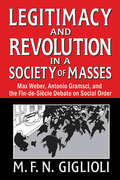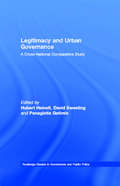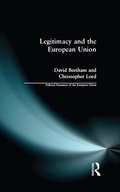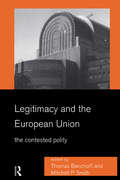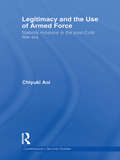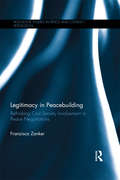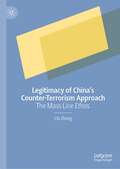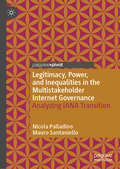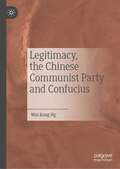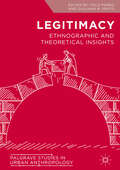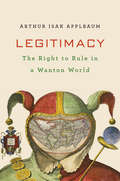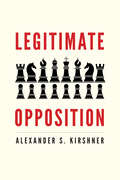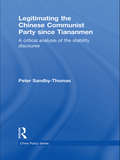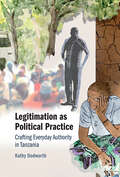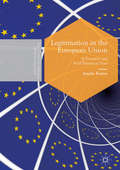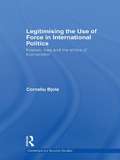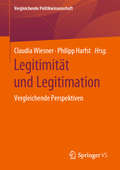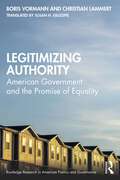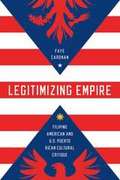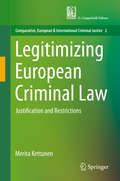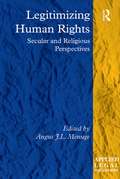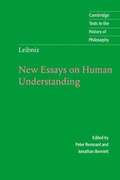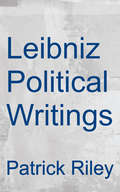- Table View
- List View
Legitimacy and Revolution in a Society of Masses: Max Weber, Antonio Gramsci, and the Fin-de-Sicle Debate on Social Order
by M. F. N. GiglioliQuestions surrounding the concept of legitimacy—the force that keeps a polity together, and whose absence causes it to shatter—are possibly the most important concern of a study of politics. M. F. N. Giglioli examines the shift to a distinctly modern understanding of the concept in Continental Europe, following the crisis of liberal rationalism in the late nineteenth century, and the search for new ways of envisaging the determinants of collective action into the twentieth century.The author examines certain aspects of the intellectual and political background of early twentieth-century theories of legitimacy elaborated by Max Weber and Antonio Gramsci. These theories are interpreted as the outcome of a contested process of redefinition of the concept, itself prompted by the social and political circumstances of the late nineteenth century, such as economic modernization and the attempt to incorporate the working class into the political system.This is the first book in a generation to offer a general reassessment of issues of legitimacy in political thought at the turn of the twentieth century. It examines the development of the concept in France, Italy, and Germany during the half-century or so following the Paris Commune. It discusses six key critics of classical Victorian liberalism on the revolutionary Left and the conservative Right. The political position and biography of each is a central focus of the study, as the culture of the age was decisively shaped by reflection on the social role of intellectuals.
Legitimacy and Urban Governance: A Cross-National Comparative Study (Routledge Studies in Governance and Public Policy #Vol. 9)
by Hubert Heinelt Panagiotis Getimis David SweetingA fresh examination of the relationship between two key issues in the on-going debate on urban governance - leadership and community involvement. It explores the nature of the interaction between community involvement and political leadership in modern local governance by drawing on empirical data gathered from case-studies concerning cities in England, Germany, Greece, Italy, the Netherlands, New Zealand, Norway, Poland, and Sweden. It presents both a country specific and cross-cutting analysis of the contributions that communities and leaders can make to more effective local governance. These country specific chapters are complemented by thematic, comparative chapters addressing alternative forms of community involvement, types and styles of leadership, multi-level governance, institutional restrictions and opportunities for leadership and involvement, institutional conditions underpinning leadership and involvement, and political culture in cities. This up-to-date survey of trends and developments in local governance moves the debate forward by analysing modern governance with reference to theories related to institutional theory, legitimation, and the way urban leadership and community involvement compliment one another. This book will be of great interest to students and scholars of politics and urban governance, and to all those concerned with questions of local governance and democracy.
Legitimacy and the European Union (Political Dynamics of the European Union)
by David Beetham Christopher LordMost of the contemporary debates about the European Union - about its role, its institutional arrangements, its development dynamic, its expansion and possible futures - revolve around the issue of political legitimacy. Legitimacy and the European Union addresses the fundamental issues at the heart of the debates on Europe and examines such key questions as:- -What is the scope of the EU's authority -Is there a legitimacy deficit? If so, how much does it matter -Does political legitimacy only reside in the nation state? Using a multi-dimensional conception of political legitimacy, the text analyses the character and problems of the European Union's authority in respect of democracy, political identity and governmental performance. Its distinctive claim is that political legitimacy can now only be understood as a process of interaction between the state and EU levels, and that this interaction impacts differentially on different member states.
Legitimacy and the European Union: The Contested Polity
by Thomas Banchoff Mitchell P. SmithSince the Maastricht ratification debate of the early 1990s, the legitimacy of the European Union has become a subject of controversy. With unprecedented force, Europeans have begun to question the need for deeper integration. Some fear threats to established national identities, while others perceive the emergence of a distant but powerful Brussels, beyond the reach of democratic control. Legitimacy and the European Union breaks with established approaches to the problem of the legitimacy of the European Union by focusing on the recent trend towards reconceptualization of the EU not as a superstate or an organization of states, but as a multi-level, contested polity without precedent. The book examines the implications of this reconceptualization for the problem of legitimacy. Individual chapters focus on policy areas, institutions and identity politics. Taken together, they reach two main conclusions. While Europeans do not strongly identify with the EU, they increasingly recognize it as a framework for politics alongside existing national and subnational structures. And while the EU lacks central democratic institutions, the integration process has spawned significant informal and pluralist forms of representation. Rethinking recognition and representation ouside the context of the nation state points to important, if little understood, actual and potential sources of EU legitimacy.
Legitimacy and the Use of Armed Force: Stability Missions in the Post-Cold War Era (Contemporary Security Studies)
by Chiyuki AoiThis book examines the concept of legitimacy as it may be used to explain the success, or failure, of key stability operations since the end of the Cold War. In the success of stability operations, legitimacy is key. In order to achieve success, the intervening force must create a sense of legitimacy of the mission among the various constituencies concerned with and involved in the venture. These parties include the people of the host nation, the host government (whose relations with the local people must be legitimate), political elites and the general public worldwide—including the intervening parties’ own domestic constituencies, who will sustain (or not sustain) the intervention by offering (or withdrawing) support. This book seeks to bring into close scrutiny the legitimacy of stability interventions in the post-Cold War era, by proposing a concept that captures both the multi-faceted nature of legitimacy and the process of legitimation that takes place in each case. Case studies on Liberia, Bosnia, Somalia, Rwanda, Afghanistan and Iraq explain how legitimacy related to the outcome of these operations. This book will be of much interest to students of stability operations, counterinsurgency, peace operations, humanitarian intervention, and IR/security studies in general.
Legitimacy in Peacebuilding: Rethinking Civil Society Involvement in Peace Negotiations (Routledge Studies in Peace and Conflict Resolution)
by Franzisca ZankerThe book offers a critical analysis of legitimacy in peacebuilding, with a focus on peace negotiations and civil society participation in particular. The aim of this book is to unpack the meaning of legitimacy for the population in peacebuilding processes and the relationship this has with civil society involvement. There is a growing consensus for addressing local concerns in peacebuilding, with the aim of ensuring local ownership. Moreover, scholars have noted a relationship between civil society inclusion in peace negotiations and legitimacy. Yet, the very idea of legitimacy remains a black box. Using data from original empirical fieldwork – including over 100 semi-structured interviews and 12 focus group discussions – the book focuses on two case studies of negotiations that, respectively, ended a long civil war in Liberia in 2003 and ended the post-election violence in Kenya in 2008. It argues that civil society involvement is conceptually insufficient to show a multidimensional understanding of legitimacy. Instead, the book shows a complex picture of legitimate peace negotiations, based on outcome and participation-based characteristics with the involvement of both ‘guarantors’ of legitimacy and a more general civic agency which includes the general population. Through forms of participative communication, the passive audience become active stakeholders in the construction of legitimacy. This has repercussions for how we think about civil society and peacebuilding more generally. This book will be of much interest to students of peacebuilding, conflict resolution, security studies and IR in general.
Legitimacy of China’s Counter-Terrorism Approach: The Mass Line Ethos
by Chi ZhangThis book examines how the Chinese Communist Party (CCP) has sought to legitimise its counter-terrorism strategy in the eyes of its domestic and international audiences. An important element of CCP policy in Xinjiang has been the deployment of ordinary Chinese citizens, or the 'mass line,’ to create new realities on the ground. This book explores how the history of ideological struggle in the PRC has taken on new characteristics, as well as offering insight into how the CCP has maintained legitimacy in the eyes of its population, even as it pursues policies which are internationally controversial, shedding light on the past and future of the behaviour of the Chinese state, a subject of interest to China scholars, scholars of the Belt and Road, and counter-terrorism experts.
Legitimacy, Peace Operations and Global-Regional Security: The African Union-United Nations Partnership in Darfur (Security and Governance)
by Linnea GelotAt the turn of the century the regional-global security partnership became a key element of peace and security policy-making. This book investigates the impact of the joint effort made by the African Union (AU) and the United Nations (UN) to keep the peace and protect civilians in Darfur. This book focuses on the collaboration that takes place in the field of conflict management between the global centre and the African regional level. It moves beyond the dominant framework on regional-global security partnerships, which mainly considers one-sided legal and political factors. Instead, new perspectives on the relationships are presented through the lens of international legitimacy. The book argues that the AU and the UN Security Council fight for legitimacy to ensure their positions of authority and to improve the chances of success of their activities. It demonstrates in regard to the case of Darfur why and how legitimacy matters for states, international organisations, and also for global actors and local populations. Legitimacy, Peace Operations and Global-Regional Security will be of interest to students and scholars of International Relations, African Security and Global Governance.
Legitimacy, Power, and Inequalities in the Multistakeholder Internet Governance: Analyzing IANA Transition (Information Technology and Global Governance)
by Nicola Palladino Mauro SantanielloThis book aims to develop a critical understanding of multistakeholder governance in Internet Governance through an in-depth analysis of the Internet Assigned Numbers Authority (IANA) transition, the process through which the U.S. Government transferred its traditional oversight role over the Domain Name System to the global Internet community. In the last few decades, multistakeholderism has become the dominant discourse in the Internet Governance field, mainly because of its promise to provide democratic legitimacy for transnational policymaking, although empirical research has highlighted disappointing performances of multistakeholder arrangements. This book contributes to the debate on multistakeholder governance by analyzing the IANA Transition process's normative legitimacy, broken down in the dimensions of input legitimacy (inclusiveness, balanced representation, and representativeness), throughput legitimacy (procedural and discursive quality), and output legitimacy (outcome and institutional effectiveness). Findings warn about the risk that multistakeholderism could result in a misleading rhetoric legitimizing existing power asymmetries.
Legitimacy, the Chinese Communist Party and Confucius
by Wai Kong NgThis book explores the use of Confucianism by the Chinese Communist Party in its assertion of political legitimacy. Confucian thought offers an enduring framework for political legitimacy in East Asian societies, including China. All states strive to acquire legitimacy, and despite once denouncing Confucianism as the remnants of feudal poison, the Party is turning towards Confucianism as part of its legitimation efforts. This suggests that the Party is suffering from an ideological void in terms of legitimacy and legitimation due to the diminishing relevance of Marxism in Chinese societal practices. The book will devise a non-liberal legitimacy framework, drawing on the ideas of Habermas and Bernard Williams, to examine the legitimacy of the Party, and use an analysis of the elite discourse to determine the nature of the Confucian turn, in a sharp polemic that will interest scholars of Chinese politics, of the role of traditional beliefs in Asian modernity, and in China's future.
Legitimacy: Ethnographic and Theoretical Insights (Palgrave Studies in Urban Anthropology #Vol. 12)
by Italo Pardo Giuliana B. PratoGlobal in scope, this original and thought-provoking collection applies new theory on legitimacy and legitimation to urban life. An informed reflection on this comparatively new topic in anthropology in relation to morality, action, law, politics and governance is both timely and innovative, especially as worldwide discontent among ordinary people grows. The ethnographically-based analyses offered here range from banking to neighbourhoods, from poverty to political action at the grassroots. They recognize the growing gap between the rulers and the ruled with particular attention to the morality of what is right as opposed to what is legal. This book is a unique contribution to social theory, fostering discussion across the many boundaries of anthropological and sociological studies.
Legitimacy: The Right to Govern in a Wanton World
by Arthur Isak ApplbaumWhat makes a government legitimate? Arthur Isak Applbaum rigorously argues that the greatest threat to democracies today is not loss of basic rights or despotism. It is the tyranny of unreason: domination of citizens by incoherent, inconstant, incontinent rulers. A government that cannot govern itself cannot legitimately govern others.
Legitimate Opposition
by Alexander S. KirshnerThe first theory of legitimate opposition in fifty years In political systems defined by legitimate opposition, those who hold power allow their rivals to peacefully challenge and displace them, and those who have lost power do not seek to sabotage the winners. Legitimate opposition came under assault at the American capitol on January 6, 2021, and is menaced by populists and autocrats across the globe. Alexander Kirshner provides the first sustained theory of legitimate opposition since the Cold War. On the orthodox view, democracy is lost when legitimate opposition is subverted. But efforts to reconcile opposition with democracy fail to identify the value of the frequently imperfect, unfair and inegalitarian real-world practice. Marshaling a revisionist reconstruction of opposition&’s history, Kirshner&’s book provides a new account of opposition&’s value fit for the twenty-first century and shows why, given the difficult conditions of political life, legitimate opposition is an achievement worth defending.
Legitimating the Chinese Communist Party Since Tiananmen: A Critical Analysis of the Stability Discourse (China Policy Series)
by Peter Sandby-ThomasThe dominant view concerning the rule of the Chinese Communist Party (CCP) is that it is simply a matter of time before it comes to an end. This view has been dominant since the pro-democracy protests in 1989 and has only been strengthened by the increasing number of protests in recent years. However, the Chinese Communist Party has continued to remain in power throughout this period and its rule appears to be secure in the short-to medium-term. As the twentieth anniversary of the military suppression of the pro-democracy demonstrations approaches, this book explains how the Chinese Communist Party has maintained its authority since 1989. It provides a detailed analysis of the Party’s discourse emphasising stability in the post-Tiananmen period, analysing the government’s propaganda in order to show how this discourse has been used by the Party to legitimate its authority. The interdisciplinary nature of this book makes it relevant to a number of different academic disciplines including Asian studies, China studies, international relations, politics and sociology.
Legitimation as Political Practice: Crafting Everyday Authority in Tanzania
by Kathy DodworthLegitimacy has long been perceived through a Westernized lens as a fixed, binary state. In this book, Kathy Dodworth offers an exploration of everyday legitimation practices in coastal Tanzania, which challenges this understanding within postcolonial contexts. She reveals how non-government organizations craft their authority to act, working with, against and through the state, and what these practices tell us about contemporary legitimation. Synthesizing detailed, ethnographic fieldwork with theoretical innovations from across the social sciences, legitimacy is reworked not as a fixed state, but as a collection of constantly renegotiated practices. Critically adopting insights from political theory, sociology and anthropology, this book develops a detailed picture of contemporary governance in Tanzania and beyond in the wake of waning Western dominance.
Legitimation in the European Union: A Discourse- and Field-Theoretical View (Postdisciplinary Studies in Discourse)
by Amelie KutterThis book offers a transdisciplinary perspective on the question of how political legitimacy is constructed in the increasingly contested postnational setting of the European Union. Drawing on the example of the controversy about the EU constitution and the use of ‘EU constitution speak’ in commentaries published by Polish and French broadsheets, it reveals the transformation that constructions of political authority and association undergo when they are being transposed from the discourse field of multilateral negotiation to that of national news media. Through an original combination of the linguistic theory of discourse developed in Critical Discourse Analysis, Bourdieu’s field theory and notion of symbolic power, and political thought on polity-building, it develops a framework for the discourse study of legitimation and Europeanisation, and proposes applications beyond the case studies in the book.To students of European integration, it demonstrates the potential these concepts have for unravelling the implicit practices of postnational polity building. Discourse researchers, on the other hand, will discover how detailed text analyses gain significance in debates related to the macro level of political organisation when guided by sociological and political theory.
Legitimising the Use of Force in International Politics: Kosovo, Iraq and the Ethics of Intervention (Contemporary Security Studies)
by Corneliu BjolaThis book aims to examine the conditions under which the decision to use force can be reckoned as legitimate in international relations. Drawing on communicative action theory, it provides a provocative answer to the hotly contested question of how to understand the legitimacy of the use of force in international politics. The use of force is one of the most critical and controversial aspects of international politics. Scholars and policy-makers have long tried to develop meaningful standards capable of restricting the use of force to a legally narrow yet morally defensible set of circumstances. However, these standards have recently been challenged by concerns over how the international community should react to gross human rights abuses or to terrorist threats. This book argues that current legal and moral standards on the use of force are unable to effectively deal with these challenges. The author argues that the concept of 'deliberative legitimacy', understood as the non-coerced commitment of an actor to abide by a decision reached through a process of communicative action, offers the most appropriate framework for addressing this problem. The theoretical originality and empirical value of the concept of deliberative legitimacy comes fully into force with the examination of two of the most severe international crises from the post Cold War period: the 1999 NATO intervention in Kosovo and the 2003 US military action against Iraq. This book will be of much interest to students of international security, ethics, international law, discourse theory and IR. Corneliu Bjola is SSHRC Postdoctoral Fellow with the Centre for Ethics at the University of Toronto, and has a PhD in International Relations.
Legitimität und Legitimation: Vergleichende Perspektiven (Vergleichende Politikwissenschaft)
by Claudia Wiesner Philipp HarfstDieses Buch behandelt Legitimität und Legitimation von und in politischen Systemen als ein Kernthema der Vergleichenden Politikwissenschaft. Damit greift es eine hochaktuelle Debatte auf. Neben der Legitimität politischer Systeme und Ordnungen wird auch Legitimation betrachtet, d.h., die Prozesse, in denen Legitimität erlangt oder mit denen sie erzeugt wird. Der Band vereint konzeptionell, normativ und auch empirisch angelegte Beiträge, die Legitimität und Legitimation politischer Systeme in den Blick nehmen.
Legitimizing Authority: American Government and the Promise of Equality (Routledge Research in American Politics and Governance)
by Christian Lammert Boris VormannLegitimizing Authority places the American state apparatus back in the foreground to rethink the development of the country’s government in the context of its unfulfilled promise of equality. The book argues that the tensions between calls for equality and the simultaneous tolerance of inequality have accompanied the rise of modern mass society and, with it, of liberal democracy. Vormann and Lammert emphasize that government has played and continues to play a decisive role in calibrating the relationship between the interior and the exterior of the nation, moving between an extractive state, a taxation state, and a welfare state over time in order to expand social access and political participation inside the national community – while tolerating conditions that continue to belie the historical promise of equality. The authors draw on a range of literatures that transcend disciplinary boundaries to reveal how exploitative practices have been accepted. They conclude that the democratic crises of the present must be comprehended through understanding how legitimation was always maintained by a state apparatus active at multiple scales and in multiple policy fields. This interdisciplinary book is addressed to a broad audience across disciplines, including political science, political economy, political history, comparative politics, international politics, international relations, American Political Development (APD), and cultural studies.
Legitimizing Empire: Filipino American and U.S. Puerto Rican Cultural Critique
by Faye CaronanWhen the United States acquired the Philippines and Puerto Rico, it reconciled its status as an empire with its anticolonial roots by claiming that it would altruistically establish democratic institutions in its new colonies. Ever since, Filipino and Puerto Rican artists have challenged promises of benevolent assimilation and portray U.S. imperialism as both self-interested and unexceptional among empires. Faye Caronan's examination interprets the pivotal engagement of novels, films, performance poetry, and other cultural productions as both symptoms of and resistance against American military, social, economic, and political incursions. Though the Philippines became an independent nation and Puerto Rico a U.S. commonwealth, both remain subordinate to the United States. Caronan's juxtaposition reveals two different yet simultaneous models of U.S. neocolonial power and contradicts American exceptionalism as a reluctant empire that only accepts colonies for the benefit of the colonized and global welfare. Her analysis, meanwhile, demonstrates how popular culture allows for alternative narratives of U.S. imperialism, but also functions to contain those alternatives.
Legitimizing European Criminal Law: Justification and Restrictions (Comparative, European and International Criminal Justice #2)
by Merita KettunenThe book examines how and according to which principles the enactment of European criminal legislation is legitimate. The approach adopted here focuses on the constitutionalization of criminal law (i.e., the growing importance of constitutional elements of the EU legal order and the ECHR regime within criminal law). Further, it shows how and why criminal law has a unique nature, and why it should not be equated with other fields of EU law.The book explains the basic research questions and methodologies, before turning to the nature of criminal law at the level of national law, and addressing the different levels of justification for criminal law. Further, it examines the most prominent features of European criminal law and the difference between general EU law and EU criminal law, as well as the theoretical ideals for European constitutional structures and criminal law. Examples of how the law in practice might not always be in keeping with these normative ideals serve to round out the coverage.
Legitimizing Human Rights: Secular and Religious Perspectives (Applied Legal Philosophy)
by Angus J.L. MenugeWhen does the exercise of an interest constitute a human right? The contributors to Menuge’s edited collection offer a range of secular and religious responses to this fundamental question of the legitimacy of human rights claims. The first section evaluates the plausibility of natural and transcendent foundations for human rights. A further section explores the nature of religious freedom and the vexed question of its proper limits as it arises in the US, European, and global contexts. The final section explores the pragmatic justification of human rights: how do we motivate the recognition and enforcement of human rights in the real world? This topical book should be of interest to a range of academics from disciplines spanning law, philosophy, religion and politics.
Leibniz: New Essays On Human Understanding
by Gottfried Wilhelm Leibniz Jonathan Bennett Peter RemnantChallenging Locke's views in Essays on Human Understanding chapter by chapter, Leibniz's references to his contemporaries and his discussion of the ideas and institutions of the age make this work a fascinating and valuable document in the history of ideas.
Leibniz: Political Writings (Cambridge Texts In The History Of Political Thought)
by Quentin Skinner Raymond Geuss Gottfried Wilhelm Leibniz Patrick RileyLeibniz's political and ethical writing long has been neglected, and with this new edition Professor Riley makes available the most representative pieces from Leibniz's political theory. This new edition, specially prepared for this series, is the first to make a considerable number of Leibniz's writings available in English, and includes three previously unpublished manuscripts, a selection of political letters, an introduction, notes, and a critical biography.
Leila
by Robin JenkinsA Scotsman in 1950s Asia becomes entangled in love and political unrest: &“As a storyteller, Jenkins has few equals.&” —Tribune Set in the Far East in the 1950s, Leila is a tender love story involving a Scottish teacher, Andrew Sandilands, and Leila, the exotically beautiful daughter of a local politician. Leila is, like her father, implicated in the revolutionary tremors shaking the small country, and the lovers are soon torn between the small-minded mores of the expatriate community and Leila&’s determined efforts to play a role in her country&’s future. The masked oppression of the regime forms the backdrop to a novel where personal dramas collide with the legacies of colonialism, in this absorbing novel from the prize-winning author of The Cone Gatherers. &“A remarkable writer.&” —The Times
